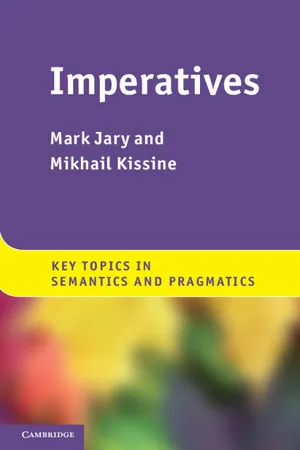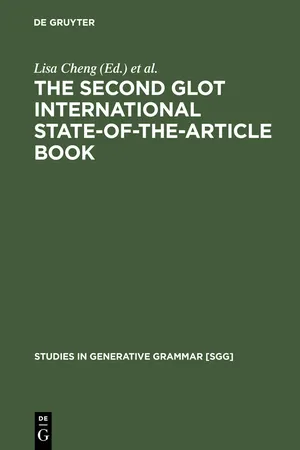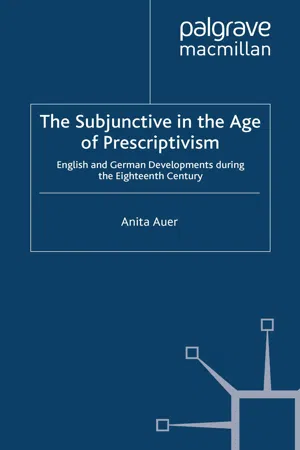Languages & Linguistics
Infinitive Mood
The infinitive mood is a verb form that typically appears with the word "to" in English, such as "to walk" or "to eat." It is used to express an action or state without indicating the subject, tense, or aspect. In some languages, the infinitive can also function as a noun or be modified by adverbs.
Written by Perlego with AI-assistance
Related key terms
1 of 5
3 Key excerpts on "Infinitive Mood"
- eBook - PDF
- Mark Jary, Mikhail Kissine(Authors)
- 2014(Publication Date)
- Cambridge University Press(Publisher)
For instance, whereas a language may have a distinct form for the second-person- singular imperative, the subjunctive may be used as a polite form, as in Spanish, or it may be found in the negative imperative (sometimes called ‘prohibitive mood’). po cura deer kill ca pĩ jitep 2SG. wood cut 24 the data A further reason why verbal mood is important for better under- standing imperative (sentential) mood is that when speech acts per- formed using sentential-mood tokens are reported, there is often a systematic relationship with the verbal mood employed in the object clause of the reporting sentence. In English, an infinitive clause is used in (44) to report (45), while in Spanish a subjunctive is used in (47) to report the imperative (46). (44) Sit down. (45) He says to sit down. (46) Siéntate. sit-IMP.2SG.REFL. Sit down. (47) He tells me to sit down. In what follows, the terms ‘mood’, ‘the imperative mood’ or just ‘the imperative’, will mean mood in the sentential sense. If we speak about mood in the verbal sense, we will make this explicit. For us, the imperative in any language will be the form – if there is one – that is prototypically and productively used for the full range of directive speech acts. To reiterate, this is not to say that it is limited to that function, but rather that if it is found in a ‘neutral context’, then the most readily available interpretation is that a directive is being issued. Furthermore, to characterise a form as ‘imperative’ in our sense, it is not sufficient for it to be prototypically employed to issue directive speech acts: it is also necessary that there be no other function – speech-act type – with which it is prototypically associated. Our definition requires that any form that is correctly called ‘impera- tive’ be productive in its directive use, so that its most accessible interpretation is directive regardless of propositional content. - eBook - PDF
The Second Glot International State-of-the-Article Book
The Latest in Linguistics
- Lisa Cheng, Rint Sybesma(Authors)
- 2014(Publication Date)
- De Gruyter Mouton(Publisher)
In contrast, the for infinitive is taken to denote futurate situations, which begin with the time of the main verb and extend into the future from there. (For example, with (66) situations which begin with the present and extend until she's a surgeon or a lawyer.) This represents the future-orientation noted above for these infinitives, and is compatible with non-cumulative accessibility relations like that for want. Since it in-volves this notion of future-orientation, the accoimt of the infinitives draws on both the temporal and modal accounts of mood. The final theory which I will discuss is that of Giorgi & Pianesi (1998). They also address the issue of crosslinguistic variation; focusing on Ro-mance and a couple of Grermanic languages (German and Icelandic), they propose that there is a scale from more indicative-like to more subjunc-tive-like contexts, with individual languages dividing it at different points. (In the end, factors enter into the analysis in addition to those which are part of the scale.) Here we'll only have the opportunity to exam-ine their treatments of French and Romanian on the one hand, and Italian on the other. Giorgi & Pianesi make use of a slightly different theory of modality than the others, that of Kratzer (1991, among others). (Quer frames his analy-sis in terms of this theory as well, but does not take advantage of its dif-ferences from the simpler one discussed above.) This theory makes use not just of a single accessibility relation, but rather two independent modal parameters of interpretation, the modal base and ordering source. The function of the modal base is to establish a set of relevant worlds; it may be seen as analogous to the accesibility relation of the simpler system. The ordering source determines a ranking of these worlds according to how similar they are to some ideal. For example: (67) John must register his car (given the laws of DC). - eBook - PDF
The Subjunctive in the Age of Prescriptivism
English and German Developments During the Eighteenth Century
- A. Auer, Kenneth A. Loparo, Charles Jones, Charles Jones(Authors)
- 2008(Publication Date)
- Palgrave Macmillan(Publisher)
He explains this as follows: As Cases are the different Endings of the Noun, which are used to denote the Respect or Reference that Things have to one another; so Moods are the different Endings of the Verb, that are made use of to express the Man- ners or Forms of its signifying the Being, Doing or Suffering of a Thing. Grammarians do not agree about the Number of these Moods, not only by Reason of the Difference there is in Languages, some being capable of receiving more or fewer Inflexions or Endings than others, but also because of the different Manners of signifying, which may be very much multiply’d: For the Being, Doing or Suffering of a Thing, may be con- sidered not only simply by itself but also as to the Possibility of a Thing, that is, whether it can be done or not; as to the Liberty of the Speaker, that is, whether there be no Hindrance to prevent his doing of a Thing; as to the Inclination of the Will, that is, whether the Speaker has any Mind or Intention to the Doing of it; or to the Necessity of the Action to be done, that is, whether there be any Obligation of any Kind upon a Person to do Thing. (Greenwood, 1711, pp. 118–119) Here Greenwood states that moods are characterised by both the seman- tic aspect and the ‘different endings of the verb’. He appears to regard the latter as the criterial property, and it is because there is little choice of inflectional endings in English that he dismisses the existence of mood in the language. However, he dedicates almost half a page to defining Latin moods and in the process illuminates his conception of the form and meaning of the English subjunctive too. For example, he provides some incidental information on its morphological characteristics when he defines the Latin subjunctive mood as depending ‘upon some other Verb in the same Sentence, with some Conjunction between; as, he is mad, if he love’ (ibid., p. 119), and also when he discusses ‘the second and third persons of verbs’.
Index pages curate the most relevant extracts from our library of academic textbooks. They’ve been created using an in-house natural language model (NLM), each adding context and meaning to key research topics.


